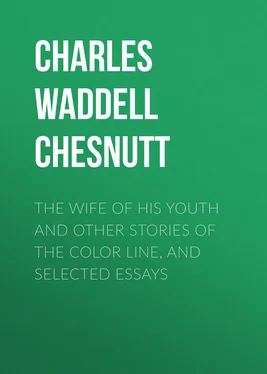Charles Waddell Chesnutt - The Wife of his Youth and Other Stories of the Color Line, and Selected Essays
Здесь есть возможность читать онлайн «Charles Waddell Chesnutt - The Wife of his Youth and Other Stories of the Color Line, and Selected Essays» — ознакомительный отрывок электронной книги совершенно бесплатно, а после прочтения отрывка купить полную версию. В некоторых случаях можно слушать аудио, скачать через торрент в формате fb2 и присутствует краткое содержание. Жанр: foreign_prose, foreign_antique, на английском языке. Описание произведения, (предисловие) а так же отзывы посетителей доступны на портале библиотеки ЛибКат.
- Название:The Wife of his Youth and Other Stories of the Color Line, and Selected Essays
- Автор:
- Жанр:
- Год:неизвестен
- ISBN:нет данных
- Рейтинг книги:5 / 5. Голосов: 1
-
Избранное:Добавить в избранное
- Отзывы:
-
Ваша оценка:
- 100
- 1
- 2
- 3
- 4
- 5
The Wife of his Youth and Other Stories of the Color Line, and Selected Essays: краткое содержание, описание и аннотация
Предлагаем к чтению аннотацию, описание, краткое содержание или предисловие (зависит от того, что написал сам автор книги «The Wife of his Youth and Other Stories of the Color Line, and Selected Essays»). Если вы не нашли необходимую информацию о книге — напишите в комментариях, мы постараемся отыскать её.
The Wife of his Youth and Other Stories of the Color Line, and Selected Essays — читать онлайн ознакомительный отрывок
Ниже представлен текст книги, разбитый по страницам. Система сохранения места последней прочитанной страницы, позволяет с удобством читать онлайн бесплатно книгу «The Wife of his Youth and Other Stories of the Color Line, and Selected Essays», без необходимости каждый раз заново искать на чём Вы остановились. Поставьте закладку, и сможете в любой момент перейти на страницу, на которой закончили чтение.
Интервал:
Закладка:
The sheriff listened calmly, but his face grew firmer, and a determined gleam lit up his gray eyes. His frame grew more erect, and he unconsciously assumed the attitude of a soldier who momentarily expects to meet the enemy face to face.
"Much obliged, Sam," he answered. "I 'll protect the prisoner. Who 's coming?"
"I dunno who-all is comin'," replied the negro. "Dere 's Mistah McSwayne, en Doc' Cain, en Maje' McDonal', en Kunnel Wright, en a heap er yuthers. I wuz so skeered I done furgot mo' d'n half un em. I spec' dey mus' be mos' here by dis time, so I 'll git outen de way, fer I don' want nobody fer ter think I wuz mix' up in dis business." The negro glanced nervously down the road toward the town, and made a movement as if to go away.
"Won't you have some dinner first?" asked the sheriff.
The negro looked longingly in at the open door, and sniffed the appetizing odor of boiled pork and collards.
"I ain't got no time fer ter tarry, Shurff," he said, "but Sis' Nance mought gin me sump'n I could kyar in my han' en eat on de way."
A moment later Nancy brought him a huge sandwich of split corn-pone, with a thick slice of fat bacon inserted between the halves, and a couple of baked yams. The negro hastily replaced his ragged hat on his head, dropped the yams in the pocket of his capacious trousers, and, taking the sandwich in his hand, hurried across the road and disappeared in the woods beyond.
The sheriff reëntered the house, and put on his coat and hat. He then took down a double-barreled shotgun and loaded it with buckshot. Filling the chambers of a revolver with fresh cartridges, he slipped it into the pocket of the sack-coat which he wore.
A comely young woman in a calico dress watched these proceedings with anxious surprise.
"Where are you going, father?" she asked. She had not heard the conversation with the negro.
"I am goin' over to the jail," responded the sheriff. "There 's a mob comin' this way to lynch the nigger we 've got locked up. But they won't do it," he added, with emphasis.
"Oh, father! don't go!" pleaded the girl, clinging to his arm; "they 'll shoot you if you don't give him up."
"You never mind me, Polly," said her father reassuringly, as he gently unclasped her hands from his arm. "I 'll take care of myself and the prisoner, too. There ain't a man in Branson County that would shoot me. Besides, I have faced fire too often to be scared away from my duty. You keep close in the house," he continued, "and if any one disturbs you just use the old horse-pistol in the top bureau drawer. It 's a little old-fashioned, but it did good work a few years ago."
The young girl shuddered at this sanguinary allusion, but made no further objection to her father's departure.
The sheriff of Branson was a man far above the average of the community in wealth, education, and social position. His had been one of the few families in the county that before the war had owned large estates and numerous slaves. He had graduated at the State University at Chapel Hill, and had kept up some acquaintance with current literature and advanced thought. He had traveled some in his youth, and was looked up to in the county as an authority on all subjects connected with the outer world. At first an ardent supporter of the Union, he had opposed the secession movement in his native State as long as opposition availed to stem the tide of public opinion. Yielding at last to the force of circumstances, he had entered the Confederate service rather late in the war, and served with distinction through several campaigns, rising in time to the rank of colonel. After the war he had taken the oath of allegiance, and had been chosen by the people as the most available candidate for the office of sheriff, to which he had been elected without opposition. He had filled the office for several terms, and was universally popular with his constituents.
Colonel or Sheriff Campbell, as he was indifferently called, as the military or civil title happened to be most important in the opinion of the person addressing him, had a high sense of the responsibility attaching to his office. He had sworn to do his duty faithfully, and he knew what his duty was, as sheriff, perhaps more clearly than he had apprehended it in other passages of his life. It was, therefore, with no uncertainty in regard to his course that he prepared his weapons and went over to the jail. He had no fears for Polly's safety.
The sheriff had just locked the heavy front door of the jail behind him when a half dozen horsemen, followed by a crowd of men on foot, came round a bend in the road and drew near the jail. They halted in front of the picket fence that surrounded the building, while several of the committee of arrangements rode on a few rods farther to the sheriff's house. One of them dismounted and rapped on the door with his riding-whip.
"Is the sheriff at home?" he inquired.
"No, he has just gone out," replied Polly, who had come to the door.
"We want the jail keys," he continued.
"They are not here," said Polly. "The sheriff has them himself." Then she added, with assumed indifference, "He is at the jail now."
The man turned away, and Polly went into the front room, from which she peered anxiously between the slats of the green blinds of a window that looked toward the jail. Meanwhile the messenger returned to his companions and announced his discovery. It looked as though the sheriff had learned of their design and was preparing to resist it.
One of them stepped forward and rapped on the jail door.
"Well, what is it?" said the sheriff, from within.
"We want to talk to you, Sheriff," replied the spokesman.
There was a little wicket in the door; this the sheriff opened, and answered through it.
"All right, boys, talk away. You are all strangers to me, and I don't know what business you can have." The sheriff did not think it necessary to recognize anybody in particular on such an occasion; the question of identity sometimes comes up in the investigation of these extra-judicial executions.
"We 're a committee of citizens and we want to get into the jail."
"What for? It ain't much trouble to get into jail. Most people want to keep out."
The mob was in no humor to appreciate a joke, and the sheriff's witticism fell dead upon an unresponsive audience.
"We want to have a talk with the nigger that killed Cap'n Walker."
"You can talk to that nigger in the court-house, when he 's brought out for trial. Court will be in session here next week. I know what you fellows want, but you can't get my prisoner to-day. Do you want to take the bread out of a poor man's mouth? I get seventy-five cents a day for keeping this prisoner, and he 's the only one in jail. I can't have my family suffer just to please you fellows."
One or two young men in the crowd laughed at the idea of Sheriff Campbell's suffering for want of seventy-five cents a day; but they were frowned into silence by those who stood near them.
"Ef yer don't let us in," cried a voice, "we 'll bu's' the do' open."
"Bust away," answered the sheriff, raising his voice so that all could hear. "But I give you fair warning. The first man that tries it will be filled with buckshot. I 'm sheriff of this county; I know my duty, and I mean to do it."
"What 's the use of kicking, Sheriff," argued one of the leaders of the mob. "The nigger is sure to hang anyhow; he richly deserves it; and we 've got to do something to teach the niggers their places, or white people won't be able to live in the county."
"There 's no use talking, boys," responded the sheriff. "I 'm a white man outside, but in this jail I 'm sheriff; and if this nigger 's to be hung in this county, I propose to do the hanging. So you fellows might as well right-about-face, and march back to Troy. You 've had a pleasant trip, and the exercise will be good for you. You know me . I 've got powder and ball, and I 've faced fire before now, with nothing between me and the enemy, and I don't mean to surrender this jail while I 'm able to shoot." Having thus announced his determination, the sheriff closed and fastened the wicket, and looked around for the best position from which to defend the building.
Читать дальшеИнтервал:
Закладка:
Похожие книги на «The Wife of his Youth and Other Stories of the Color Line, and Selected Essays»
Представляем Вашему вниманию похожие книги на «The Wife of his Youth and Other Stories of the Color Line, and Selected Essays» списком для выбора. Мы отобрали схожую по названию и смыслу литературу в надежде предоставить читателям больше вариантов отыскать новые, интересные, ещё непрочитанные произведения.
Обсуждение, отзывы о книге «The Wife of his Youth and Other Stories of the Color Line, and Selected Essays» и просто собственные мнения читателей. Оставьте ваши комментарии, напишите, что Вы думаете о произведении, его смысле или главных героях. Укажите что конкретно понравилось, а что нет, и почему Вы так считаете.












